8 Tips for Makeup Hygiene
July 25, 2017
Before we get into the details of makeup application, let’s talk about hygiene and sanitation. You might think, “Well only professional makeup artists that work on multiple clients have to worry about that. I only use my own products and don’t share them, so they won’t get contaminated.” Sorry to burst your bubble, you can still contract infections from your own makeup and should always follow some simple rules to keep your makeup and makeup tool clean and sanitary.
- Wash your hands
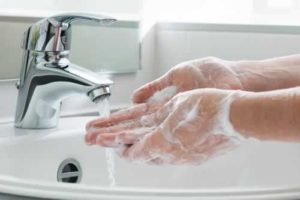
Ok, this might seem like an obvious one, but let’s be honest. How many times have you applied makeup on the run, at the office bathroom, in the car? What did you touch immediately before you put your fingers right next to your eyes to apply some eyeliner? Even if you have just showered and are getting ready to go in your own bathroom, take the 20 seconds and wash your hands with some soap.
- Wash your face
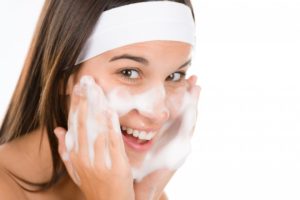
Now this should be a pretty straightforward one too, but trust me, we all have done it. You wake up, have breakfast, get your kids ready, feed the dog, get dressed, and then you throw on some makeup. Sure you showered the night before and it’s not like your bedroom is dirty. Well think again. Your pillow takes a lot of beating at night, when you are sweating, tossing and turning and rubbing off dead skin cells, and maybe it even has some leftover makeup on, from that one night that you were just too tired to bother removing it. (PS: When was the last time you washed your pillow case?) Take a minute before applying makeup in the morning (or whenever) to give your face a quick rinse. Tie your hair back, use a face wash suitable for your skin and wash it off (not too cold and not too hot). Your skin will look fresher and more glowing whether you wear foundation, BB cream or nothing at all.
- Clean your brushes
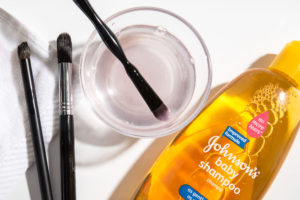
I recently saw a YouTube video of a woman saying “this is how a “regular” person applies makeup, not one of those Instagram makeup artists.” Sure the everyday woman will apply makeup differently from social media celebrities or professional makeup artists, no argument there. However she then proceeded to pull out an old brush that looked like she inherited it from her mother, admitted that it is several years old and she has never washed it and it was sticky and crusty. A few seconds later she applied foundation with it on her face and I have to admit, I felt a little bit sick. I wanted to reach through the computer and grab that brush and wash it or better toss it in the trash. Now if you are not a professional makeup artist, you don’t have to spend hundreds of dollars on brush sets, nor do you have to buy expensive brush cleaner from places like Sephora. And no, you don’t have to clean your brushes after every use as long as you are the only one using them. However, I would recommend once per week or every two weeks, take a few minutes and wash all your brushes. A mild (baby) shampoo (I love using Dove since it doesn’t dry out the bristles and it is gentle on the skin without leaving any strong fragrances or oils behind) and some warm water is all you need. Simply wash the brushes with the shampoo and warm water, rinse them with some cool water, pat them dry with a soft towel or tissue paper and let them dry in a clean location on top of a towel or some paper towels.
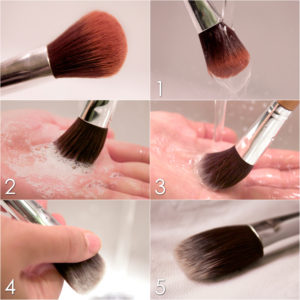
This will extend the life of your brushes, keep the germs away and protect your skin, lips and eyes from infections. And yes, you can wash your sponges and powder puffs the exact same way.
- Clean your makeup
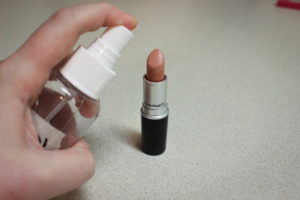
Probably one of the more overlooked steps in hygiene and sanitation for non-professionals, but nonetheless important. I would recommend maybe once per month, but at least every 3 months, go through your makeup and clean it. What I mean by that is take all your makeup out of wherever you are storing it and set it out on a table. Grab some 70% alcohol from the drugstore (if you have access to a beauty or other store that sells 99% alcohol, even better) and put it in a small spray bottle. Start with your pencils, lip liners, eye liners, etc. Sharpen them all with a pencil sharpener or if they are the self-sharpening kind that you just have to twist out, spray them with some alcohol. Wait a few seconds for the alcohol to dissipate before closing them up again. Lip sticks you can give a small sprits with the alcohol, but don’t over do it because the alcohol can dry them out.
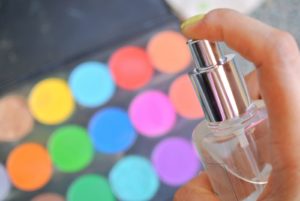
Eye shadow palettes, blushes, bronzers and other pressed powders are just as easy to clean. Spray them with some alcohol (also just a mist, don’t soak it), wipe the areas between and the lid, where loose powder has accumulated and keep them open until the alcohol has dried.
- Toss old makeup
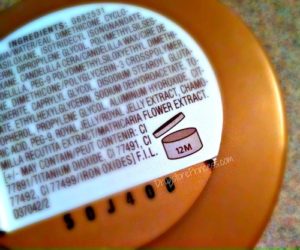
There are hundreds of blogs with hundreds of tips out there that will tell you when to toss your old makeup. Stick to the label on the makeup if there is one. Most makeup has a tiny number with the letter “M” behind it printed on the original packaging or directly on the product. That is the number of months after which you should get rid of it. Sure, just like in the grocery store, certain things might not be expired immediately the day after the printed expiration date, but with food, most people use some good judgment and avoid bad milk and maybe keep some crackers a month after their sell by date. With makeup, it’s a bit different and we can rarely see if the product is “spoiled.” I recommend a combination of your own judgment and the number printed and recommended by the manufacturer. Things that touch your eye and your lips where the risk of infection is greater, maybe toss them sooner rather than later. Old mascara is a huge cause of eye infections, so be extra careful with that. Powders might be ok to use for a few weeks or months after the “expiration” date, as long as you keep it sanitary and clean it like I described in #4 on a regular basis.
- Mascara
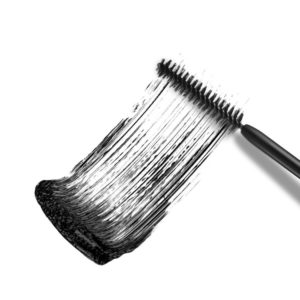
Yes, I have to make a separate point for mascara, because this is one of the most common mistakes I see, even among professional makeup artists. When you open your mascara and pull out your wand, please avoid at all costs the pull out, stick in, pull out, stick in method to load it up with mascara. Every time you pull the mascara wand out, you let air get in and on the wand, then you push it directly into the mascara and repeat it 2-5 more times. Rather than pulling in and out, just unscrew the wand, pull it out a little bit and then circle the brush along the sides to load up on mascara. As long as your hands and your face is clean you will be able to avoid contaminating your mascara with bacteria as much as possible.
- Don’t share makeup
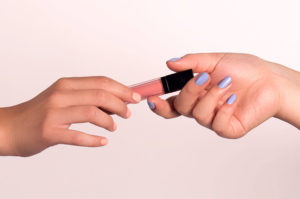
Sure, we all do it. A friend has an amazing new lipstick and we just have to try it. Do you know if they clean their makeup on a regular basis? Are they just getting over a cold or do they maybe get cold sores (yes, I am talking about herpes! Don’t hate your friend, it’s much more common than you think. About 50-80% of American adults have oral herpes. But as long as you don’t share makeup, drinks or kiss, you will be fine!)? If you really want to try that lipstick, maybe at least give it a wipe with a tissue paper (no that will not prevent transmission of bacteria or diseases 100%, but it’s better than doing nothing). Or if you are at home, spray it with your 70-99% alcohol, which will kill any germs on the surface. This also applies to you sharing your own makeup. If you have good sanitation and follow all the above rules, then go ahead and have your friend try you bronzer, but be sure to clean your brushes and spray your makeup with your alcohol after.
- Remove your makeup at night
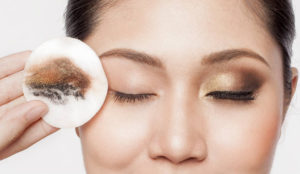
“Sleep Naked” is probably the best and most important rule to follow. Take the time at night to remove your makeup before you go to bed. However, makeup wipes or makeup remover on a cotton round can only do so much. Your eye makeup and mascara should get an extra wipe, but be gentle (don’t rub too hard, the tissue around the eye is the most sensitive and you want to avoid stretching it too much or you’ll see those crows feet sooner that you’d want to). You can even use lightly moistened q-tips to remove mascara with a light rolling motion from the top down.
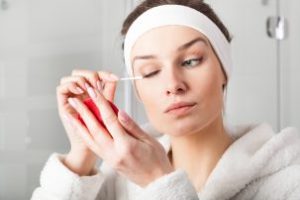
Make sure to wash your face with face wash to remove any residue of makeup or makeup remover. Your face will be able to breathe at night and your pillowcase will stay much cleaner without those mascara stains.
I hope I was able to give you some helpful tips to keep your makeup clean. Some of you might agree with me, some of you might not. Always use your best judgment when it comes to your own hygiene and your own body.
Do you have any other sanitation or hygiene tips? I would love to hear from you, so just leave a comment below.